- Home
- E. E. Burke
Redbird
Redbird Read online
Redbird
Steam! Romance and Rails, Book 2
E.E. Burke
Contents
Chapter 1
Chapter 2
Chapter 3
Chapter 4
Chapter 5
Chapter 6
Chapter 7
Chapter 8
Chapter 9
Chapter 10
Chapter 11
Chapter 12
Chapter 13
Chapter 14
Chapter 15
Chapter 16
Chapter 17
Chapter 18
Chapter 19
Chapter 20
Chapter 21
Chapter 22
Chapter 23
Chapter 24
Author’s Note
Afterword
Also by E.E. Burke
About the Author
Original edition copyright 2013
New edition copyright 2021
E.E. Burke
All rights reserved.
No part of this book may be reproduced in any form or by any electronic or mechanical means, including information storage and retrieval systems, without written permission from the author, except for the use of brief quotations in a book review.
* * *
Redbird (previously published as the novella Kate’s Outlaw) is a work of fiction. All characters and events in this publication, other than those clearly in the public domain, are fictitious and any resemblance to real persons, living or dead, is purely coincidental.
* * *
Cover Design by Erin Dameron-Hill
Train photography by Matthew Malkiewicz
* * *
Published by E.E. Burke
eBook ISBN 978-0-9985382-8-0
Paperback book ISBN 978-0-9985382-9-7
www.eeburke.com
Chapter 1
August 1, 1870
Ladore, Kansas
* * *
“The Indians call it a smoking dragon.” Judge Levi Parsons gestured proudly to a framed print hanging in his private railcar that featured an eight-wheel, diamond-stack engine of the type he had purchased for his railroad.
Kate leaned forward in her chair for a better look. The woodcut had been commissioned by her father, somewhat prematurely in her opinion, to celebrate the completion of the Missouri, Kansas & Texas Railway. In fact, Texas was still three hundred miles away.
“Smoking dragon, eh?” Henry Stevens, the railroad’s Chief of Operations, smoothed his hand over a neatly trimmed beard. To hide a smile? He unfolded himself from where he sat beside Kate and moved to his boss’s side to admire the artwork. “I can see how Indians unfamiliar with machinery might mistake a locomotive for a mythical beast.”
“A beast that will devour them if they continue to stand in our way!” her father roared.
Kate rolled her eyes. Lord, she was tired of his chest beating. He’d been on the warpath ever since Henry had given him a report on their construction progress—or lack thereof. Construction had stopped barely sixteen miles inside Indian Territory after the Cherokee Nation launched a legal battle asserting sovereignty over their lands.
“Father, you know we cannot legally proceed until the government awards us the land grants they promised, or until we come to an agreement with the Cherokee Nation—”
He pounded his fist on the desk. “We don’t have to put up with these savages stalling us with their endless demonstrations. We’ll arm the workers, conceal cannons in freight cars—”
“Cannons? Do you want to start a war?” Kate gripped the bolstered chair arms and came to her feet. “These savages, as you call them, are educated men. We won’t get anywhere by threatening them. We must negotiate.”
“That sounds like something a woman would suggest,” her father grumbled.
She smiled sweetly at the intended insult. “Are you acknowledging that women are superior at diplomacy? If so, I agree.”
“Mr. Stevens thinks we should ask for the army’s help.”
“Does he now?” She received a shrug from Henry rather than a firm acknowledgement. Because he knew it was a stupid idea, no matter who came up with it. “The army won’t move one peg over the border without explicit orders. It’s unlikely they’ll invade.”
“Who said anything about invading?” Her father crossed to a map pinned to the opposite wall, which showed the existing and proposed railroad route. He put his finger on the block letters Cherokee Nation. “The land in question is ours. We won the rights, fair and square.”
She might not use the word fair to describe their victory over a competing railroad that had started construction long before them. “Yes, we won. Now we have an opportunity to step up to a higher moral ground and establish a solution that will benefit everyone.”
“That’s what we all want, Kate—a solution.” Henry rolled up his shirtsleeves, revealing tanned and corded forearms. He’d already shed his coat when the temperature in the car soared to new heights.
No one could question his dedication and determination or his willingness to work hard. He had driven spikes in the pouring rain, helping his crews cross the finish line. It was one of the reasons she’d initially admired him and allowed him to court her. However, the more time she spent with him, she was less sure they would suit. She could be pragmatic, of course. Not at the expense of her ideals.
She crossed to an open window framed by velvet curtains with gold tassels and gazed out at a sea of switch grass, scorched by the afternoon sun. For a young woman who’d grown up in New York, this wild, untamed land should seem foreign. Oddly enough, it suited her personality much better than stodgy parlors and glittering ballrooms.
“Move ahead with construction, regardless,” her father instructed Henry.
“We’ll have to remove several hundred Indians living on our proposed route.”
“Then do so, by God...”
Even the air felt different. Out here, the wind blew hot—although no hotter than the air these two men were spewing. All they did was growl and grumble about how to intimidate their new neighbors. Construction would never get moving again if they didn’t learn they couldn’t walk all over everybody.
“Not a single acre of that land will be ours unless the courts uphold the government’s right to give it to us,” she said firmly. “Until then, it belongs to the Cherokee—and we’re trespassing.”
“Miss Parsons, you’re starting to sound more like an Indian agent than a railroad director.” Henry used a teasing tone, which he might suppose would soften the rebuke. It didn’t.
“Mr. Stevens, I merely point out that claiming we own the land, when we don’t, will not get us anywhere.”
She turned to her father, who had returned to his chair behind the desk. He defied the weather in a three-piece suit with his vest buttoned. “What do you think the chances are for a judgement in our favor?
“About the same as convincing you to return to New York.”
The barb, delivered without a hint of humor, sank deep. Her father might as well come out and say he had no use for her.
She folded her arms over the bodice of a utilitarian jacket. He eyed her garb with disdain. Another thing he disliked, her manner of dress. Out here, it was more practical to wear pantaloons beneath her skirt in lieu of bustles and petticoats. “If you base your odds on my departure, then I would say your chances are nil.”
Her father shook his head. “I can hold out hope, provided the Indians don’t prove to be as stubborn as you are.”
She smiled as if he’d make a joke and pretended it didn’t hurt. “Persistence is one of the more useful traits I inherited from you, Father.”
“And it is an admirable trait,” Henry said, leaping into his self-appointed role as arbitrator. “So is prudence.
You know how dangerous it is out here, Kate. Until we entered Indian Territory, we had the army to protect us. As you said, we can’t count on that moving forward.”
He yielded to her while remaining firmly in her father’s camp. Perhaps she’d underestimated his talent for shrewd diplomacy. “What is your point, Henry?”
“My point is, Indian Territory isn’t a safe place for a woman. Even one as brave as you.” In two long strides, he was next to her, taking her arm to lead her back to her seat.
Kate withdrew from his grasp. While her suitor could be quick with the compliments, he made little effort to champion her cause. His excuse? He couldn’t afford to antagonize his boss. Things would be different, he argued, after they were married. She wasn’t so sure.
“Adella McGrady lives with her husband at the worksite and conducts her own photography business. You don’t have an issue with that.”
Henry dismissed her argument with a wave. “I could care less where she lives, as long as she doesn’t become a distraction for the rest of the crew. And she’s the foreman’s wife. His problem, not mine.”
Kate stiffened at the insult. “I am not someone’s problem. I can take care of myself.”
“You know that’s not what I meant.”
“I’d say you struck the nail head on,” her father interjected. “Kate nearly got herself blown up back in New Chicago.”
Her face heated at the reminder of the near disaster after a protestor had attempted to blow up the line. “That wasn’t my fault. The woman was mentally deranged.”
“Does it matter whose fault it was? The explosion stopped construction for a week.”
Did he care that his daughter had been spared? If her own sire thought so little of her, no wonder few men found much to recommend her, save an attractive inheritance. She wasn’t naive about why Henry courted her. He wished to be president when her father stepped down, and his boss had set the bait.
She put on a wry smile to hide the hurt. “Rest assured, I won’t suggest dynamite as a bargaining tool.”
Henry’s laugh sounded forced. “I should hope not. Whiskey works much better.”
The muscles in her neck and shoulders tensed. She could put up with Henry’s inclination to make light of serious subjects. What she had a hard time accepting were his methods for dealing with problems. “Why is it when we are faced with an obstacle, you opt for the most expedient solution, no matter that it might cost more in the long run? Like those cheap rails that will have to be replaced.”
Henry’s amused expression vanished. “Those inexpensive rails enabled us to win this race.”
“Kate.” The way her father growled her name made it clear he was losing patience.
She lifted her hands in surrender. Berating his trusted operations chief for past decisions wouldn’t win his favor. “Yes, I know, we won. But serving whiskey to the Tribal Council won’t get us to Texas. We’ll draw the ire of federal agents, and make the Cherokee leaders more suspicious.”
Henry sank into the chair nearest the desk and stretched out his long legs. He laced his fingers over his chest, by all appearances, unconcerned. “Honestly, Kate. Who’s going to care if we throw them a party?”
Perdition. Why expend energy trying to change Henry’s mind? Her father was the one she needed to win over.
Judge Levi Parsons had become wealthy man through smart investments. Then he’d sunk everything into the Katy. If the railroad faltered, he’d be made a pauper and laughingstock. She knew they could still succeed without sacrificing their integrity, except it would mean doing things differently than what had been done over the past year.
Kate approached the desk, as he continued to sort through papers. “Father, I lobbied for the suffrage movement, I understand politics, and I’ve been reading up on treaties governing Indian lands. Allow me to meet with the Tribal Council and broker an agreement.”
Her father picked up an official-looking document and scowled. “Where do you suppose a bunch of savages get the money to hire Washington lawyers? I thought they were poor.”
She wrestled for control of her temper. Either he sparred with her or ignored her, anything to avoid taking her seriously. “An anonymous donor must be supporting their cause. My guess would be your adversary, Mr. Joy. He was most unhappy his railroad lost the race. Regardless, we can’t wait for the courts to decide the issue. We must negotiate—”
“Precisely.” Her father slapped the paper on the desk. “We can’t wait. We’re bleeding money every day we sit here.”
“I feel certain we could reach an acceptable compromise if you would—”
“Come to the party next week, Kate.” Henry cupped her shoulders, his idea of an affectionate gesture. Sadly, she felt nothing save a vague sense of disappointment.
As aggravating as he could be at times, he could also be very charming. If she could work up tender feelings, marriage wouldn’t seem so…distasteful. As it was, the harder she tried, the less she desired him. Even though her father dearly wanted the match, she drew a line at what she would do to gain his approval.
Kate twisted out of Henry’s grasp. “I don’t wish to be part of something I can’t support.”
Henry’s smile turned indulgent. “You can talk to the members of the Tribal Council there. They prefer to negotiate in social settings.”
Ah, she could speak to them at a party, but not across the bargaining table.
“I have no objection to being social, as long as you don’t use liquor as a negotiating tool.”
“Of course not.” Henry spread his hands, indicating agreement. Even if he only intended to placate her, she would seize the opportunity he provided.
“I’m glad we see eye to eye, Henry. With Father’s permission, I’ll arrange a follow-up meeting with the Tribal Council after the event.
Her father leaned back in his chair, stroking a chest-length gray beard, looking thoughtful.
Kate boldly met her sire’s cerulean gaze, another trait they shared, along with a head for business. Something he hadn’t yet acknowledged.
“Women don’t negotiate treaties,” he stated.
“It’s not a treaty. It’s a business agreement.”
“Women don’t negotiate business agreements.”
She’d turned a small trust from her grandmother into a tidy fortune—more than most men could claim. “They do if they have ownership in the business. Mrs. Langford sits on the board of the Border Tier railroad, and she has interests in several other businesses. She advised me to—”
“Mrs. Langford doesn’t own this business.”
“But I do.”
“No, you do not.”
A knot formed, which made it hard to swallow. What was he saying, that she wouldn’t inherit? Did he plan to leave everything to Henry?
No. He planned to live forever.
She cleared her throat. “Other than the obvious fact that I am your sole heir, as an investor I wish to play a vital role.”
An awkward silence filled the sweltering car. Kate’s scalp grew damp. She glanced over at Henry, who’d taken to studying his nails. Now he was silent, right about the time when she could use his support.
Her father came to his feet with his fingers braced on the desk. He did that when he was working up to a storm. “Mary Katherine, your only role is to support Mr. Stevens. While you are at it, I expect you to stay out of trouble. If you cost me any more time or money, I swear I will personally box you up and ship you out on the next train bound for New York.”
Chapter 2
August 10, 1870
Cherokee Nation, Indian Territory
* * *
The smoking dragon crouched on metal rails with its nose pointed south, directly at the heart of the Tsa-la-gi Nation. Tonight, Uk-te-na didn’t hiss or spew its dark breath. It sat silent, like a predator anticipating a kill.
Jake crept along the dark side of the locomotive, which his people had named after a mythical serpent. None of them believed the engine had s
pecial powers. They knew it was just a machine. But like its namesake, it had been created to be used as a tool of domination. Its owners were the real monsters—and they had to be stopped.
Clouds skated across the sky to reveal a full moon. Its light struck the engine’s reflective iron skin and caught the two men crouched next to it in a pale glow.
Jake hunched to make himself small. A difficult task. He topped most of the men in his tribe by several inches, including the man in front of him. He stood out when he would rather fit in.
As he passed between two cars, he glimpsed a bonfire on the other side. The orange flames leapt above the heads of the dancers. Their writhing silhouettes cast shadows over a patch of ground cleared for the celebration. Strains of fiddle music mixed with shouts of drunken revelry.
The railroad chief’s party had been underway since sunset, and by all indications, would not end anytime soon. The honored guests, members of the Cherokee Tribal Council, had chosen not to attend. They could not be bribed. They’d also warned their people to stay away. Yet, there were always those who were happy to take advantage of free liquor.
“Go to the end, the fanciest railcar,” Jake whispered to his cousin, who followed him. He and Charley could be in and out in a matter of minutes while the party was still underway.
Jake stilled when a rhythmic crunch of footsteps came from the other side of the train. In the darkness, his black clothes would help conceal him.

 Jolie- A Valentine's Day Bride
Jolie- A Valentine's Day Bride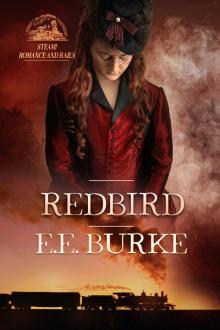 Redbird
Redbird Valentine's Rose
Valentine's Rose The Drum_The Twelfth Day
The Drum_The Twelfth Day Tempting Prudence: The Bride Train
Tempting Prudence: The Bride Train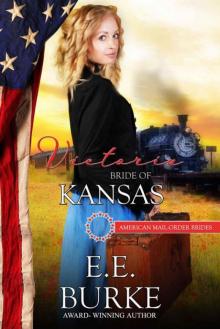 Victoria: Bride of Kansas (American Mail-Order Bride 34)
Victoria: Bride of Kansas (American Mail-Order Bride 34) Santa's Mail-Order Bride
Santa's Mail-Order Bride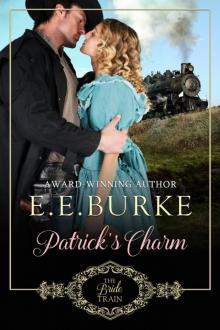 Patrick's Charm (The Bride Train, #2)
Patrick's Charm (The Bride Train, #2) Santa's Mail-Order Bride (American Mail-Order Bride 34.5)
Santa's Mail-Order Bride (American Mail-Order Bride 34.5) Maybe Baby
Maybe Baby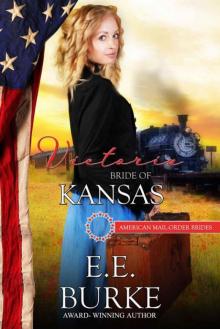 Victoria_Bride of Kansas
Victoria_Bride of Kansas Seducing Susannah: The Bride Train
Seducing Susannah: The Bride Train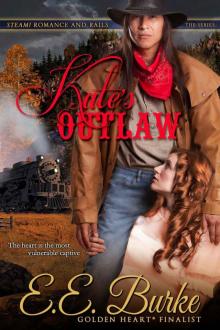 Kate's Outlaw (Steam! Romance and Rails)
Kate's Outlaw (Steam! Romance and Rails)